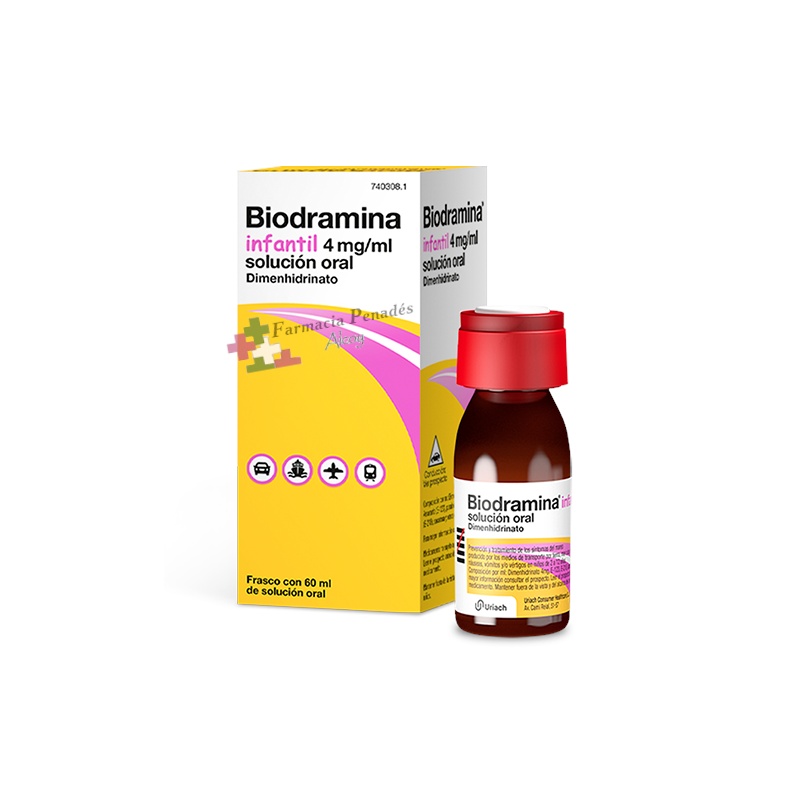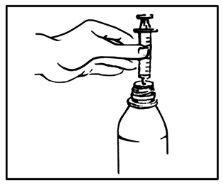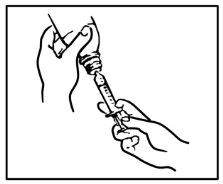
BIODRAMINA INFANTIL 4 mg/ml ORAL SOLUTION


How to use BIODRAMINA INFANTIL 4 mg/ml ORAL SOLUTION
Translated with AI
This page provides general information and does not replace a doctor’s consultation. Always consult a doctor before taking any medication. Seek urgent medical care if symptoms are severe.
Show originalContents of the leaflet
Introduction
Package Leaflet: Information for the User
Biodramina Infantil 4 mg/ml Oral Solution
Dimenhydrinate
Read the entire package leaflet carefully before starting to take this medication, as it contains important information for you.
Follow the administration instructions for the medication contained in this package leaflet or as indicated by your doctor or pharmacist.
- Keep this package leaflet, as you may need to read it again.
- If you need advice or more information, consult your pharmacist.
- If you experience side effects, consult your doctor or pharmacist, even if they are not listed in this package leaflet. (See section 4).
- You should consult a doctor if your symptoms worsen or do not improve after 7 days.
Contents of the Package Leaflet:
- What Biodramina Infantil is and what it is used for
- What you need to know before taking Biodramina Infantil
- How to take Biodramina Infantil
- Possible side effects
- Storage of Biodramina Infantil
- Package Contents and Additional Information
1. What Biodramina Infantil is and what it is used for
Dimenhydrinate is the active ingredient in this medication and acts against motion sickness caused by means of transportation.
It is indicated for the prevention and treatment of symptoms of motion sickness caused by land, sea, or air travel, such as nausea, vomiting, and/or dizziness in children from 2 to 12 years old.
You should consult a doctor if your symptoms worsen or do not improve after 7 days.
2. What you need to know before taking Biodramina Infantil
Do not take Biodramina Infantil
- If you are allergic to dimenhydrinate, diphenhydramine, or any of the other components of this medication (listed in section 6).
- If you have porphyria (a rare, usually hereditary disorder in which large amounts of porphyrin are eliminated in feces and urine).
- If you have asthma attacks.
Warnings and Precautions
- If you have asthma, severe respiratory diseases (chronic obstructive pulmonary disease, emphysema, chronic bronchitis), as it may cause thickening of secretions and alter expectoration.
- If you have a disease that causes abnormal increased activity of the thyroid gland (hyperthyroidism), increased intraocular pressure (glaucoma), enlarged prostate (prostatic hypertrophy), hypertension, or any disease that causes obstruction of the urinary or gastrointestinal tract.
- If you have seizures with convulsive movements, with or without loss of consciousness (epilepsy).
- If you are over 65 years old, dry mouth, urinary retention, nausea, sedation, confusion, and low blood pressure (hypotension) may occur.
- If you are taking any medication that causes ear toxicity, as symptoms of those toxic effects, such as ringing in the ears, dizziness, or vertigo, may be masked.
- If you have any liver or kidney disease, stomach or duodenal ulcer, or stomach inflammation (gastritis), you should consult your doctor before taking this medication.
- You should consult your doctor before taking this medication if you have or have had heart diseases (cardiac arrhythmia, myocardial ischemia, ...).
- If you suspect you may have symptoms of appendicitis, such as nausea, vomiting, or abdominal cramps, it is recommended to consult a doctor to rule out the presence or absence of appendicitis, as dimenhydrinate may hinder the diagnosis of this disease.
- It is recommended to avoid exposure to very high temperatures and follow adequate hygiene and dietary measures, such as proper ventilation and hydration.
- Avoid exposure to the sun (even on cloudy days) and ultraviolet lamps (UVA rays) while taking this medication.
Children
Do not use this medication in children under 2 years old.
Taking Biodramina Infantil with other medications
Tell your doctor or pharmacist if you are taking, have recently taken, or may take any other medication.
In particular, if you are using any of the following medications, it may be necessary to modify the dose of Biodramina Infantil or not take it:
- Anesthetics and other substances with a depressant effect on the central nervous system
- Antibiotics of the aminoglycoside group
- Antidepressants, such as monoamine oxidase inhibitors (MAOIs)
- Antiparkinsonian medications
- Neuroleptics (used to calm agitation and neuromuscular hyperactivity)
- Ototoxic medications (that can affect the ear) (see warnings and precautions section).
- Medications that can cause photosensitivity (skin reactions due to sensitivity to sunlight).
Interference with diagnostic tests:
If you are going to undergo any allergy test, including skin tests, it is recommended to stop treatment 72 hours before starting the test to avoid altering the results.
Taking Biodramina Infantil with food, drinks, and alcohol
It is not recommended to consume alcohol while taking this medication.
Pregnancy, breastfeeding, and fertility
If you are pregnant or breastfeeding, think you may be pregnant, or plan to become pregnant, consult your doctor or pharmacist before using this medication.
Taking medications during pregnancy can be hazardous to the embryo or fetus and should be monitored by your doctor.
Women who are breastfeeding should not take this medication without first consulting their doctor or pharmacist, as this medication passes into breast milk.
Driving and using machines
Do not drive or operate hazardous machinery, as this medication can cause drowsiness or decreased reaction capacity at recommended doses.
Biodramina Infantil contains amaranth (E 123), sucrose, methylparaben (E 218), benzyl alcohol, propylene glycol (E 1520), and sodium.
- This medication may cause allergic reactions because it contains amaranth (E 123).
- This medication contains sucrose. If your doctor has told you that you have an intolerance to certain sugars, consult with them before taking this medication.
- This medication may cause allergic reactions (possibly delayed) because it contains methylparaben (E 218).
- This medication contains 150 mg of propylene glycol per ml.
If the child is under 5 years old, consult your doctor or pharmacist, especially if they have been given other medications that contain propylene glycol or alcohol.
If you are pregnant or breastfeeding, do not take this medication unless it is recommended by your doctor. Your doctor may perform additional checks while you are taking this medication.
If you have liver or kidney failure, do not take this medication unless it is recommended by your doctor. Your doctor may perform additional checks while you are taking this medication.
- This medication contains 0.025 mg of benzyl alcohol per ml. Benzyl alcohol may cause allergic reactions.
Benzyl alcohol has been linked to the risk of serious side effects, including respiratory problems ("gasping syndrome") in children.
This medication should not be used for more than one week in children under 3 years old unless indicated by your doctor or pharmacist.
Consult your doctor or pharmacist if you are pregnant or breastfeeding. This is because large amounts of benzyl alcohol can accumulate in your body and cause side effects (metabolic acidosis).
Consult your doctor or pharmacist if you have liver or kidney disease. This is because large amounts of benzyl alcohol can accumulate in your body and cause side effects (metabolic acidosis).
- This medication contains less than 1 mmol of sodium (23 mg) per ml; i.e., it is essentially "sodium-free".
3. How to take Biodramina Infantil
Follow the administration instructions for the medication contained in this package leaflet or as indicated by your doctor or pharmacist. If in doubt, ask your doctor or pharmacist.
The recommended doses are:
Children from 2 to 6 years old: 3 to 6 ml of the oral solution per dose (12-24 mg of dimenhydrinate).
If necessary, repeat the dose every 6 to 8 hours. Do not take more than 18 ml of Biodramina Infantil per day (72 mg of dimenhydrinate), divided into several doses.
Children from 7 to 12 years old: 6 to 12 ml of the oral solution per dose (24-48 mg of dimenhydrinate). If necessary, repeat this dose every 6 to 8 hours. Do not take more than 36 ml of Biodramina Infantil per day (144 mg of dimenhydrinate), divided into several doses.
Children under 2 years old: Should not be used in children under 2 years old.
Patient with liver disease: should consult their doctor before taking this medication, as it may be necessary to reduce the dose.
This medication is taken orally.
It is recommended to take the first dose at least 30 minutes before starting the trip (preferably 1-2 hours before), and if not taken beforehand, the first dose should be taken when symptoms appear. If the motion sickness persists, wait at least 6 hours between one dose and the next.
It is recommended to take this medication with food, water, or milk to minimize gastric irritation.
If the symptoms worsen or persist for more than 7 days, consult your doctor.
Instructions for the correct administration of the medication
Before taking this medication, carefully read the following instructions:
- Open the bottle by following the instructions on the safety cap. Press on the surface and unscrew in the opposite direction of the clock hands.
When opening for the first time, the seal will break.
- Insert the dosing syringe by pressing on the hole in the pierced cap (see Figure 1).
- Invert the bottle and withdraw the dose indicated in the package leaflet (see Figure 2).
- Administer directly with the dosing syringe or place the contents of the dosing syringe in a spoon.
- The dosing syringe should be washed after each dose and can be sterilized, if necessary, by boiling in water or immersing in the sterilizing solution used for baby bottles.
Figure 1 |
Figure 2 |
If you take more Biodramina Infantil than you should
If you have taken more Biodramina Infantil than you should, consult your doctor or pharmacist immediately.
Symptoms of overdose include mainly: dilated pupils, flushed face, excitement, hallucinations, confusion, stomach and intestinal irritation with nausea, vomiting, and diarrhea, movement disorders, convulsions, deep loss of consciousness (coma), sudden decrease in respiratory and cardiac function (cardiorespiratory collapse), and death. Symptoms may take more than 2 hours to appear after the overdose.
In case of overdose or accidental ingestion, consult your doctor or pharmacist immediately or call the Toxicology Information Service (phone: 91.5620420), indicating the medication and the amount ingested.
4. Possible side effects
Like all medications, Biodramina Infantil can have side effects, although not everyone will experience them.
Side effects are usually mild and temporary, especially at the beginning of treatment.
During the use of dimenhydrinate, the following adverse reactions have been observed, whose frequency could not be established with precision:
- Nausea, vomiting, constipation, diarrhea, stomach pain.
- Lack of appetite and dry mouth.
- Drowsiness and sedation (drowsiness).
- Headache, dizziness, and vertigo.
- Increased viscosity of mucus in the bronchi, making breathing difficult.
- Urinary retention and impotence.
- Glaucoma (increased intraocular pressure).
- Pupil dilation, blurred vision, or double vision.
- Allergic reactions on the skin and sensitivity to sunlight after intense exposure, which can cause hives, itching, and skin redness.
- Decrease in blood cells, including red blood cells, white blood cells, leukocytes, and platelets.
- Porphyria (a rare, usually hereditary disorder in which large amounts of porphyrin are eliminated in feces and urine).
- Hypertension or hypotension (increased or decreased blood pressure).
- Tachycardia, palpitations, and/or cardiac arrhythmias.
- Hyperexcitability may occur, especially in children, with symptoms such as insomnia, nervousness, confusion, tremors, irritability, euphoria, delirium, palpitations, and even convulsions.
If you experience side effects, consult your doctor or pharmacist, even if they are not listed in this package leaflet.
Reporting side effects:
If you experience any side effects, consult your doctor or pharmacist, even if they are possible side effects not listed in the package leaflet. You can also report them directly through the Spanish Medication Surveillance System for Human Use: https://www.notificaram.es. By reporting side effects, you can contribute to providing more information on the safety of this medication.
5. Storage of Biodramina Infantil
Keep this medication out of the sight and reach of children.
No special storage conditions are required.
Do not use this medication after the expiration date shown on the box and label after EXP. The expiration date is the last day of the month indicated.
Medications should not be disposed of through wastewater or household waste. Deposit the packaging and medications you no longer need at the SIGRE collection point in your pharmacy. If in doubt, ask your pharmacist how to dispose of the packaging and medications you no longer need. This will help protect the environment.
6. Package Contents and Additional Information
Composition of Biodramina Infantil
- The active ingredient is dimenhydrinate. Each ml of oral solution contains 4 mg of dimenhydrinate. The other ingredients (excipients) are: propylene glycol (E 1520), methylparaben (E 218), sucrose, strawberry flavor (contains benzyl alcohol), amaranth (E 123), sodium saccharin (E 954), and purified water.
Appearance of the product and package contents
Biodramina Infantil is a clear red solution with a strawberry flavor and odor.
It is presented in a 60 ml bottle with a pierced cap and a 6 ml dosing syringe that can be attached to the cap. The bottle is closed with a safety cap.
Marketing Authorization Holder
URIACH CONSUMER HEALTHCARE S.L.
Av. Generalitat 163-167
08174 Sant Cugat del Vallès (Barcelona - Spain)
Manufacturer
ITALFARMACO S.A.
San Rafael 3.
28108 Alcobendas (Spain)
Date of the last revision of this package leaflet:October 2013
"Detailed and updated information on this medication is available on the website of the Spanish Agency for Medicines and Health Products (AEMPS) http://www.aemps.gob.es."
- Country of registration
- Active substance
- Prescription requiredNo
- Manufacturer
- This information is for reference only and does not constitute medical advice. Always consult a doctor before taking any medication. Oladoctor is not responsible for medical decisions based on this content.
- Alternatives to BIODRAMINA INFANTIL 4 mg/ml ORAL SOLUTIONDosage form: CHEWING GUM, 20 mg dimenhydrinateActive substance: diphenhydramineManufacturer: Uriach Consumer Healthcare S.L.Prescription not requiredDosage form: TABLET, 50 mgActive substance: diphenhydramineManufacturer: Uriach Consumer Healthcare S.L.Prescription not requiredDosage form: TABLET, 50 mgActive substance: diphenhydramineManufacturer: Laboratorios Cinfa S.A.Prescription not required
Online doctors for BIODRAMINA INFANTIL 4 mg/ml ORAL SOLUTION
Discuss questions about BIODRAMINA INFANTIL 4 mg/ml ORAL SOLUTION, including use, safety considerations and prescription review, subject to medical assessment and local regulations.
Frequently Asked Questions

















